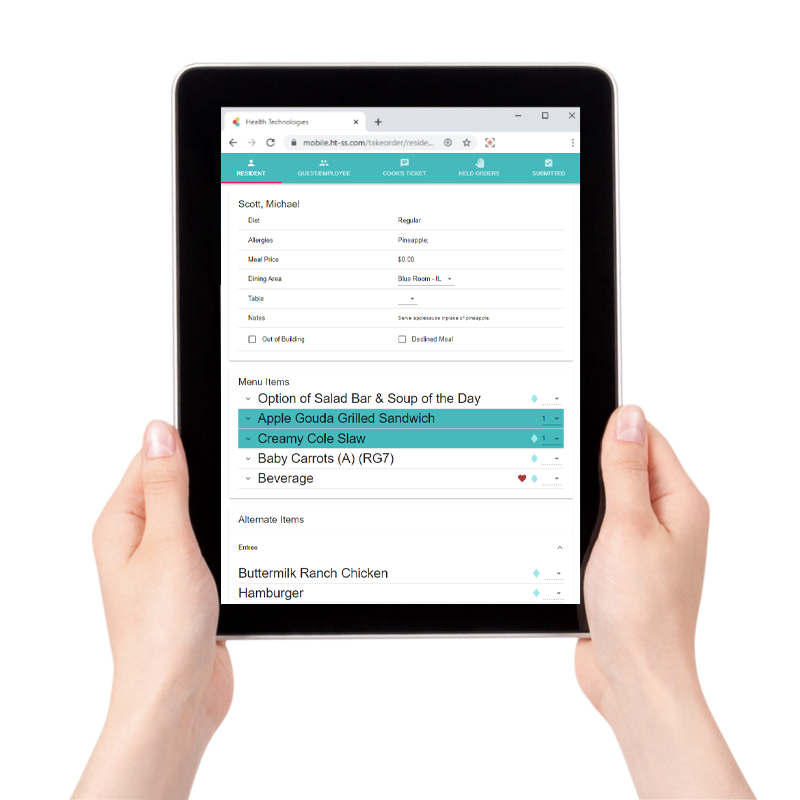Kind Dining
Creating a Culture of Hospitality
Our training provides a measurable return on your investment in 4 ways.
Enhance Resident Satisfaction
Improve the dining experience by fostering genuine hospitality and respect, making residents feel valued and cared for.
Empower Staff with Confidence
Train dining and caregiving staff to engage with confidence during meal service, boosting morale and job satisfaction.
Promote Person-Centered Care
Support culture change by emphasizing resident choices and meaningful connections at mealtimes.
Strengthen Teamwork and Service Quality
Encourage collaboration between departments, leading to smoother meal service and a stronger sense of community.
The Foundations of Great Service
Module
1
Can we make a house a HOME?
Module
2
Who are you Serving?
Module
3
What do you bring to the table?
The Nuts and Bolts of Great Service
Module
4
Making it Personal
Module
5
Symphony of Service
Module
6
If I Only Had a Heart
Maintaining Great Service
Module
7
Emotional Control
Module
8
Don't Touch That!
Module
9
Polishing Service
Module 1: Can we make a house a HOME? lays the foundation of valuing the significance of the dining experience, the work of each server, and discovering the best path to making it more meaningful and enjoyable for everyone.
We invite students to participate, interact, be empowered, and be challenged to help find workable solutions that break down barriers to their success, challenge the status quo, and gain new insights and skills to improve the community spirit of working and living together in this community.
As a participant in this module, you will:
- Examine the science and psychology of hospitality. Yes, really!
- Explore how to be more attentive to and connect in our relationship with residents and their dining experience
- Translate, and get behind a company's mission statement and how it relates to dining and you
- Analyze a list of what gets in your way to be more successful in your job.
Module 2: WHO are you Serving? sets out to broaden an understanding of the aging process, create deeper relationships, and promote person-centered hospitality.
We practice exercises around the dining setting that create empathy and compassion for the aging process community-wide.
As a participant in this module, you will:
- Examine our aging population and its impact on you
- Explore some general stages of aging and quality of life
- Be able to appreciate the lives of older people
- Learn how we contribute to other's dignity & satisfaction with Whole Care
- Be attentive to the dining experience as it becomes more personal
- Practice communicating in a way that nourishes this community
Module 3: What do YOU bring to the Table? offers even more extended communication training.
We ask learners to look in the mirror and discuss their own strengths by way of a self-assessment.
We challenge them to learn new skills and behaviors to be significant in their work.
As a participant in this module, you will:
- Recall and relate to using a “mirror” in different ways
- Examine teamwork skills and why they matter (to us!)
- Discover how to become more understood
- Explore what characteristics delight our residents
- Be attentive to how to hear people better
Module 4: Making it Personal presents the knowledge, skills and attitudes required to ensure that the flow of the meal meets resident's expectations.
Pre-service planning to protect the integrity of the product (meal served) is a critical element that no server is born knowing.
At all levels of dining care, we focus on teaching an appreciation of this particular planning and how getting it right shows a special appreciation for the residents and one another.
As a participant in this module, you will:
- Explore why checklists are important.
- Check your own appearance and attitude against a list of personal readiness items
- Practice skills in positively presenting the menu to residents
- Identify set-up requirements based on your menu.
- Be attentive to improve skills in meeting and greeting residents and their guests
Module 5: The Symphony of Service orchestrates how the server sets the ambiance through their knowledge, skills and serving actions individually and as a team.
They learn to appreciate the control they do have to set the atmosphere in how professionally they serve the meal and apply best practices for service and infection control.
As a participant in this module, you will:
- Describe the proper flow of the meal.
- Review the process of taking an order
- Explore three levels of care.
- Recognize visual cues in reading the table.
- Apply Best Practices for service and Infection Control
Module 6: If I Only Had a Heart embraces the importance of dining as a feature element to the success of the community.
We teach relational skills. In fun, but challenging exercises, servers practice the fundamentals of politeness and courtesy.
Developing rapport is essential to any excellent person-centered hospitality culture and is especially important in serving older adults living in senior living communities.
As a participant in the If I only had a Heart module, you will:
- Be able to demonstrate kindness and friendliness to others throughout the meal
- Apply courtesy words and phrases to use every day, and especially in difficult situations.
- Acquire some chit chat skills often needed to start and end conversations.
- Become skilled in recognizing-and responding-to our residents and co-worker's emotional state and needs.
- Identify the core values that drive you to go the extra mile.
Module 7: Emotion Control addresses two of the areas most requested by the staff:
How to deal with complaints (when situations go wrong) and how to manage our own emotions around the loss of a resident we have served.
As a participant in the Emotion Control module, you will:
- Examine new insights in how to respond to others' emotions
- Review and practice the L.E.A.R.N. communication tool, learned in Module 3, which helps us through difficult or stressful moments
- Explore the art of making a sincere apology • Use new skills when we are in a sensitive moment of handling grief and loss
Module 8: Don't Touch That! boldly centers on skills necessary to practice food safety, infection control and protect residents from food-borne illness.
Our older adult population is at higher risk of getting sick from poor food handling and poor personal hygiene habits.
The session arms food servers with vital skills to reduce the spread of germs, be they Norovirus or Coronavirus, providing serving staff with greater confidence to help them view their role more seriously and professionally.
As a participant in the Don't Touch That! module, you will:
- Explore common foodborne illnesses and the keys to preventing their spread.
- Breakdown the essential principles for time and temperature control
- Improve and maintain personal health and hygiene to ensure food safety.
- Handle foods, plates, glassware, and utensils to avoid cross-contamination.
Module 9: Polishing Service challenges staff to continually look for areas to improve the living and working environment for residents and staff.
Skills focus on what to look for and how to communicate with team members, and managers so that the business and environment continue to thrive.
As a participant in the Polishing Service module, you will:
- Explore more about the different types of people you work with
- Explore a new way to communicate and cooperate to support one another within a team, and across teams.
- Take initiative to make improvements by personally changing things you can control.
- Participate in the actions your management is taking to transform dining
Customer Testimonials
The Kind Dining® 9-module eLearning training series is evidence-based, and values-driven.
After completing this continuing professional education course, the learner should be able to:
- Reinforce to all staff the importance of their residents' dining experience as a valuable part of their daily quality of life and sense of belonging in your community.
- Introduce quality service elements and service standards necessary to deliver a safe, quality meal in a comfortable, enjoyable, social dining environment for all.
- Build competencies (knowledge, skills, and attitudes) necessary for servers to create an optimum dining experience.
- Foster a sense of teamwork and cooperation that includes working across disciplines and within departments.
- To empower serving staff to own the dining experience and perform the skills necessary to reduce serving errors and make good point-of-service decisions at all levels of care.
- Develop the necessary company infrastructure to implement and then sustain person-centered hospitality.
Our Kind Dining® self-study course is available on-demand (24/7) and on any device.
After your order is placed, you will receive access to courses and materials via the Internet and our learning management system.
The 9-module series includes:
- Interactive lectures with a specific handbook you need to download. It contains key content for each session
- Modules that vary in length depending on the topic and feature an expert instructor.
- The online multiple-choice quiz and CPE Exam, follow each module.
- The Critical Thinking Tool (CTT), and Evaluation Form
It takes approximately 8 hours to complete all 9 sessions. Up to 11 hours are allowed for credits.
- Modules can easily be completed in just a couple of hours a week.
- Learners have 60 days to access and complete the course.
The PDF Handbook link is located (in the Resource Tab at the top right corner of every slide).
The Handbook is:
- In a digital, downloadable, and printable PDF format.
- >Select the best option for you to use during the training.
- Make sure you save the digital version to your hard drive to save all of your answers.
For your convenience, in the Resource Tab, are all the handbooks for you to print at once. Put these in a 3-ring binder for easy reference.
- The Downloadable Handbook is for your individual use, not to be shared or duplicated.
Order Instructions - Individual:
After registration and payment, you will be contacted with an email from DiningRD.
This email delivers your login, password, and direct link to the online course materials.
Upon receiving your login and password, you will have 60 days to complete the coursework.
If you have not received the email within 24-48 hours, email Kind Dining at education@DiningRD.com
Order Instructions - Group:
Please Reach out to DiningRD Education, if you have an interest in learning more about how we work with larger companies and offer group training.
Please contact us at education@DiningRD.com if you have additional questions.
Once your registration is complete, DiningRD will email you within 1 business day with your access information.
There are no refunds after training materials have been sent. Online training is not shareable, not returnable, and not transferable.
Only the person registering for the training will receive a certificate.
Please Read Below How To Receive Your Certificate
Upon passing the quiz and exam, Fill out, print, and submit forms to education@DiningRD.com - Critical Thinking Tool (CTT) is found in the Resource Slide in the right-hand corner of each slide and Kind Dining Evaluation form. (The link is in Module 9, slide 16, the Thank You slide)
Please Note: Read How To Receive Your Certificate under the CPE Approvals Tab
This course is intended for RDNs, NDTRs, and CDMs, as well as Executives and Leadership teams.
RDNs, NDTRs, and CDMs: Review section below about How To Receive Your Certificate
CDR Activity Number (from Kind Dining®): 169490 Self Study Activity Type: 740 Web-based
CPE Level: 1-3 (depending on module)
Suggested CDR Performance Indicators:
- 1.1.7 Builds collaborative relationships to encourage professional growth and development.
- 2.3.3 Identifies opportunities for shared benefit and vision.
- 2.4.3 Models behaviors that maximize group participation by consulting, listening, and communicating clearly.
- 7.2.10 Demonstrates knowledge of the causes of foodborne illness and applies required practice to reduce risk.
Note: Numerous other Performance Indicators may apply.
The Academy of Nutrition and Dietetics (Academy) and Commission on Dietetic Registration(CDR) are not responsible for the provider's interpretation of the Academy/CDR Code of Ethics for the Nutrition and Dietetics Profession or its enforcement as it relates to the scenarios and content presented in this activity.
CBDM
This course is also approved by The Certifying Board of Dietary Managers (CBDM).
(Expiration Date is 7/24/2026)
Hours: 11 9 for general, 1 for sanitation, and 1 for ethics.
Approval Number is 166994
Each CDM in attendance will be required to report their CE hours by logging into their online account at www.ANFPonline.org.
CDMs are to retain a copy of the certificate of completion in the event they are audited.
From CBDM: “All CBDM Prior Approved programs are subjected to the CE hour limitations for a program type as defined by CBDM policy. For more information, please refer to The CBDM Guide to Maintaining your Credential”.
Note: How To Receive Your Certificate
- Upon passing the quiz and exam, Fill out, print, and submit these forms.
- For CDR
- Submit to eduation@DiningRD.com both the Kind Dining® Evaluation form. (The link is in Module 9, slide 16, the Thank You slide)
- Critical Thinking Tool (CTT) is found in the Resource Slide in the right-hand corner of each slide.
- For CBDM
- Submit to education@DiningRD.com both the Kind Dining® Evaluation form. (The link is in Module 9, slide 16, the Thank You slide)
- For CDR

Cindy Heilman
Cindy Heilman is the creator of Kind Dining.
Cindy's life's work and passion is working with aging services communities that want to transform their culture, create a community of belonging, and deliver an exceptional dining experience for their residents at every meal.
Cindy has published a book, “Hospitality for Boomers” and been recognized for her professional contributions as a Dietetic Technician Registered by the Academy of Nutrition and Dietetics.
The partnership between DiningRD and Kind Dining marks a significant milestone in enhancing the dining experience for senior residents. With DiningRD's expertise in dietitian services and foodservice software, combined with Kind Dining's hospitality training, the collaboration is set to elevate the standard of service in senior care facilities. This union promises to deliver not just meals, but a dining experience that respects the dignity and preferences of every resident.
Request More Info
Interested in software or dietitian services? Tell us more!


